Using a Nutribullet to Grind Coffee? Read These Tips First!
Like most people, you probably use your Nutribullet to make smoothies and other healthy drinks.
But did you know that with the right blade, you can also use it as a blade grinder to grind coffee beans?
Well, sort of…
You can definitely grind coffee in a Nutribullet, but the resulting grinds will be different from using a burr grinder. The machine is not designed to create uniform-sized coffee particles, so you cannot use it to brew a balanced cup.
But that being said, if you don’t have a dedicated coffee grinder and you’re desperate for your morning cup of joe, the NutriBullet will do.
Here is everything you need to know to get the best results.
Optimal Nutribullet Setup For Grinding Coffee
A few Nutribullet models can be used for grinding coffee, but the best ones are the original 600 and the Pro 900.
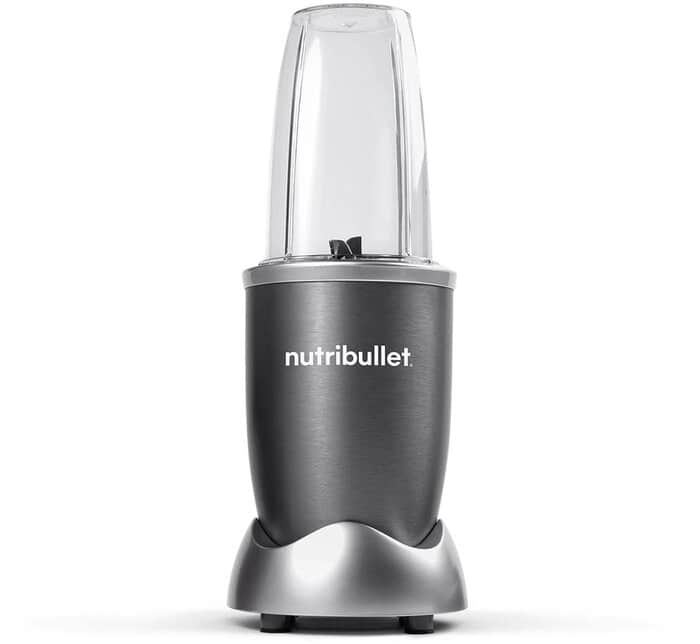
The original model has a 600-watt motor, which is already strong enough to tackle even light-roast coffee beans.

The 900 Pro has a more powerful 900-watt motor, which makes for faster “grinding”.
These are not the most powerful models, but they are strong enough for the job.
And more importantly, you can only fit the 600 and the 900 with Nutribullets’ milling blade.
Nutribullet Milling Blade
The milling blade is a flat blade designed for grinding dry ingredients like coffee beans and nuts. On the other hand, the extractor blade (cross blade) is designed to blend smoothies and juices. It heats up quickly and would chop the beans rather than grind them.
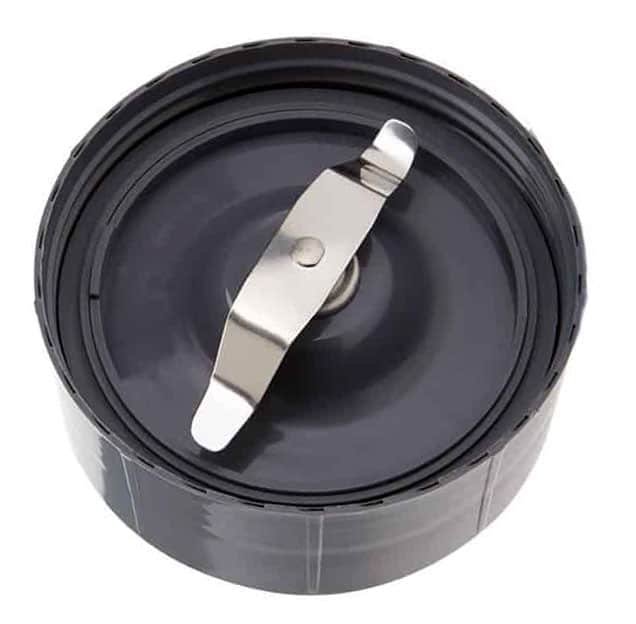
The stronger Nutribullet models like the Rx may have more power and more features, but you can’t fit them with the milling blade. You could technically use the extractor blade (or any other food processor as well), but the results would be very inconsistent.
Coffee grind consistency in a Nutribullet
When you grind coffee beans in a blade grinder like the Nutribullet, the blades chop up the beans into smaller and smaller pieces. The result of this grinding process is that instead of uniform-sized grinds, you get:
- some coarser coffee grounds, and
- some that are finer.
“What’s the big deal with having uniform coffee grinds?” you might ask.
Well, it turns out that consistent-sized grinds are pretty important if you want to make a great cup of joe.
Here’s why: different size coffee grounds extract at different rates and significantly impact the taste of your final beverage. Mixing fine and coarse grinds will result in:
- over-extracted, bitter taste from the finer grinds, and
- under-extracted, weak flavor from the coarser grinds.
Not an award-winning cup of coffee.
To ensure the coffee particles are extracted evenly, you need a burr coffee grinder. But that is a different story you can read more about here.
How to Grind Coffee Beans in a NutriBullet
It’s easy to grind coffee with a Nutribullet – and you can get coarse, medium, or fine grounds depending on how long you pulse the blender.
Here are step-by-step instructions for each type of grind, assuming you use the standard 24-ounce cup. You might also want to check out this coffee grind size chart to know what you’re aiming for.
Coarse ground coffee
Fill the pitcher 3/4 full with roasted coffee beans, attach it to the motor, and pulse three times to get coarse grinds.
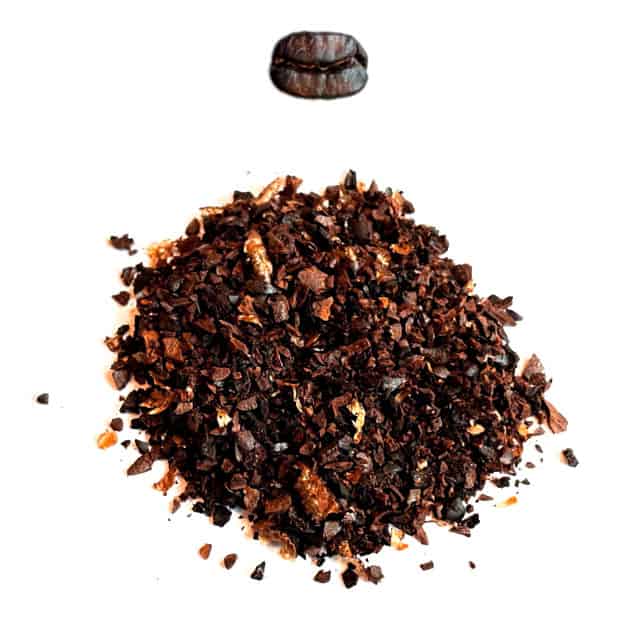
The coarse grind size you can achieve with a Nutribullet is suitable for French press and other immersion brewing methods. The problem, though, is that you’ll also have a lot of smaller coffee particles in the grind, and they will add bitterness to your brew since they will be in contact with the water for too long.
Medium ground coffee
For a medium grind, fill the pitcher 3/4 full with roasted coffee beans and attach it to the motor. Pulse five times to get medium-sized grinds.
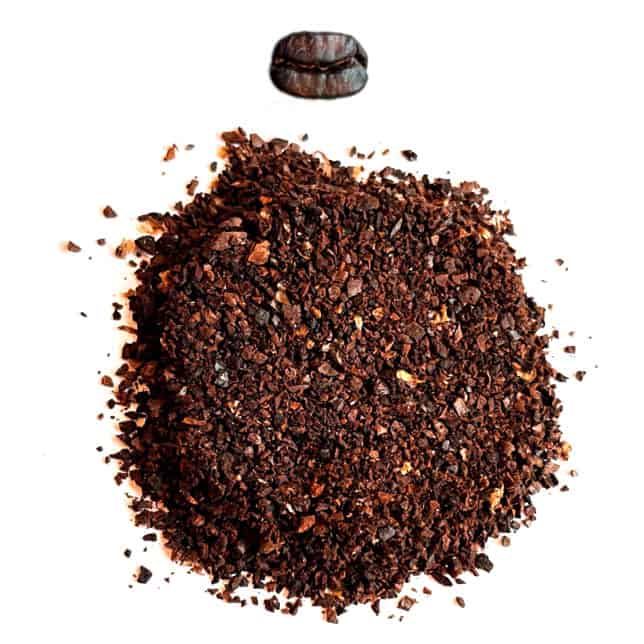
This grind is good for drip coffee makers.
Fine & extra fine ground coffee
To get a fine grind, fill your Nutribullet’s cup 3/4 full of whole coffee beans as before, and run in 10-second intervals for 1-2 minutes total time grinding.
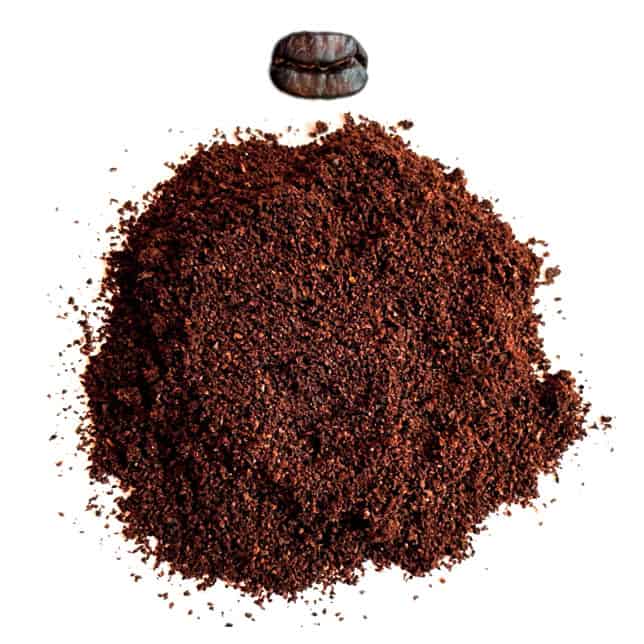
Continue for up to 4-5 minutes to get extra fine grinds for Turkish coffee.
IMPORTANT TIP: Turn the Nutribullet upside down and shake it once or twice between each incremental pulse when you’re grinding fine or extra fine. This helps distribute the grinds better in the hopes of creating a more even grind.
Remember to Clean Your NutriBullet After Grinding Coffee Beans
After emptying your ground coffee, you need to clean your Nutribullet to avoid cross-contamination of flavors. Unless you want some coffee flavor in your next smoothie 🙂
- Remove the cup from the base and wash it by hand or on the top shelf of your dishwasher. If there are tough stains, fill the cup with warm soapy water and let it soak for a few minutes before washing again.
- To clean the base, use a damp cloth to wipe around slowly (careful not to get cut on the blades!) until you remove all the residue.
- Once everything is rubbed off, give your Nutribullet a final rinse with clean water and dry it thoroughly before storing or using it again.
The Drawbacks to Grinding Coffee with a Nutribullet
Even though you can grind coffee in a Nutribullet, it is far from ideal for several reasons:
- Your grinds will be inconsistent, so you’ll never be able to make a “perfect” cup with any brew method.
- Don’t even think about grinding 18 grams for an espresso, you can’t dose your coffee beans properly. If you fill the cup lower than the recommended 3/4 volume, the beans jump all over the place.
- This means you’ll have ground coffee beans left over for storage, so you might as well buy pre-ground coffee.
- There are no grind settings per se. You control the size of your coffee particles based on intuition.
Important tips for using the Nutribullet for coffee grinding
- Use the milling blade (the one with two prongs), not the extractor blade (the one with four prongs).
- Pulse the machine AND shake the grinds between pulses until you reach your desired grind consistency.
- Don’t grind for too long, as the heat from the blades will heat up your grinds and degrade their quality.
- Try to use your ground coffee as fast as possible. Put everything you don’t use into an airtight container.
- Getting a semi-consistent fine grind is easier than an even coarse grind.
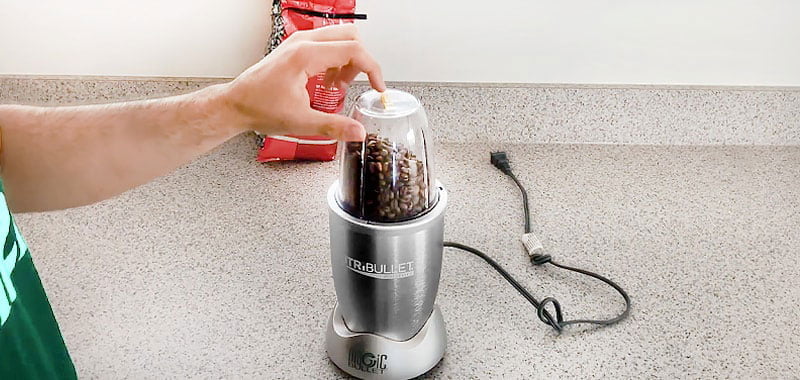
Should you grind coffee beans with a Nutribullet?
If you’ve gotten this far in the article, you already know that the Nutribullet is capable of grinding coffee. But the question is, should you use it for this purpose?
If you consider yourself a coffee enthusiast, it’s not the best idea to use a NutriBullet blade grinder to grind your beans. You will not be happy with the results, and I guarantee that you’ll never see one used in a specialty coffee shop 🙂
Both types of blades (milling & extractor) are capable of it, but they’re not designed for grinding evenly sized particles, and the grinds will be too fine and too coarse simultaneously. The NutriBullet doesn’t have adjustable settings like proper coffee grinders, so you won’t get a consistent grind size.
If you have no other options, use the Nutribullet (or pre-ground coffee), but I recommend you get a burr grinder instead.

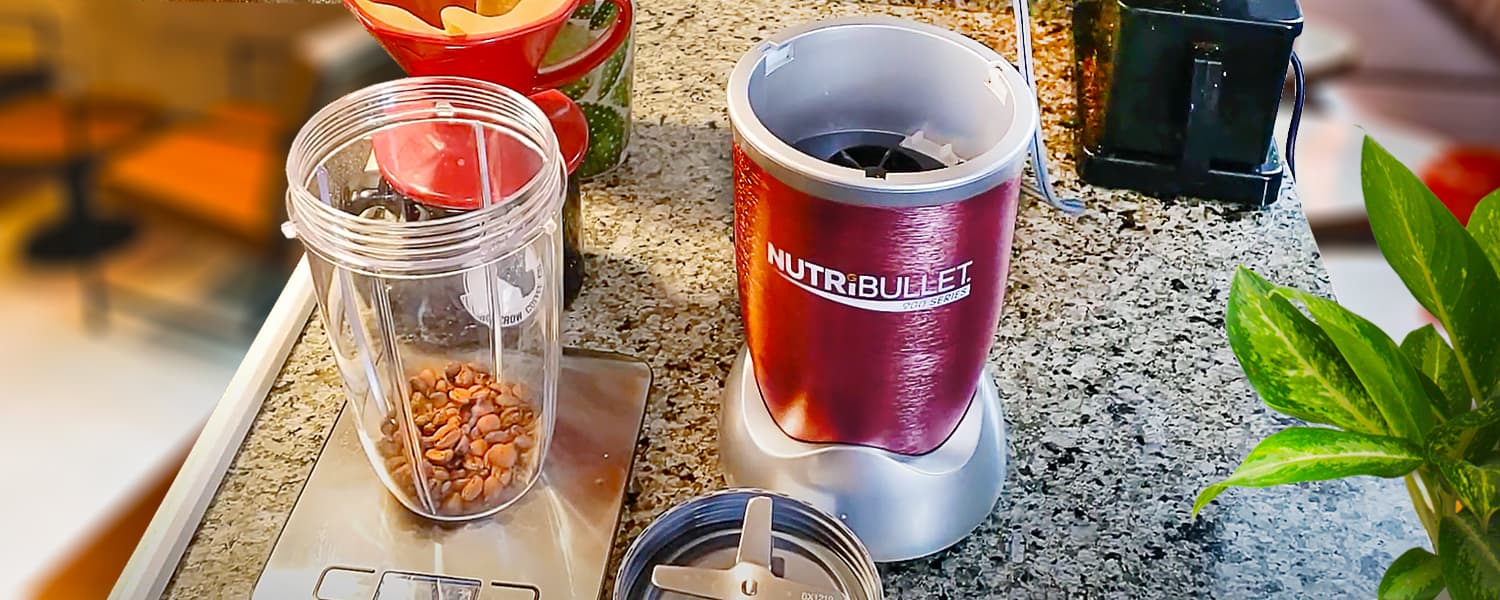
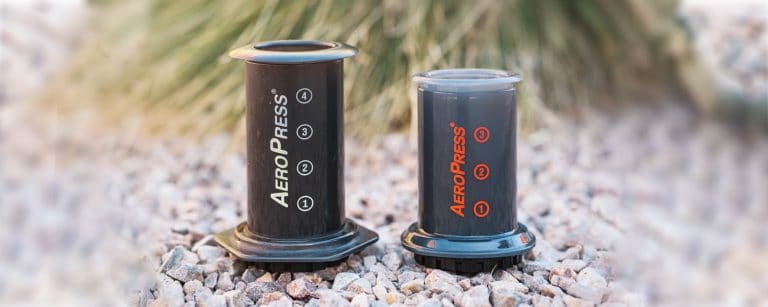
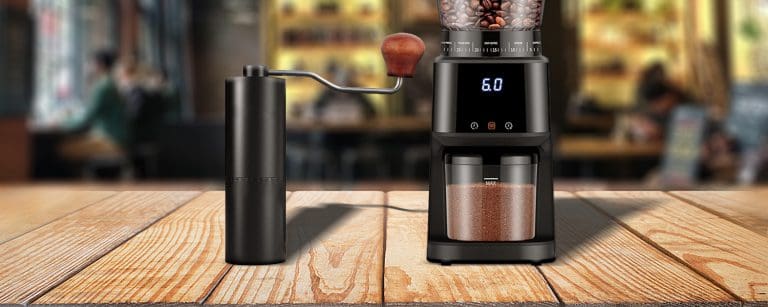
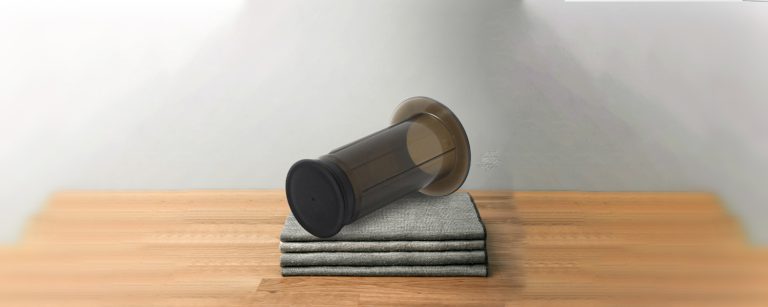

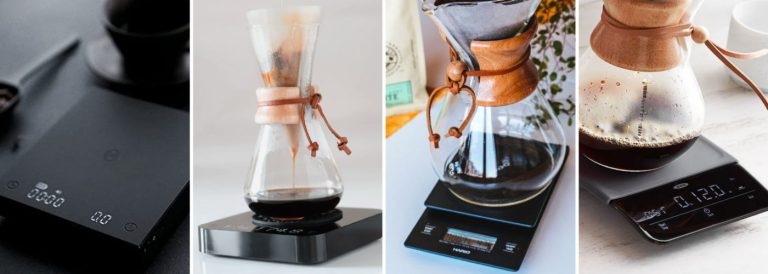
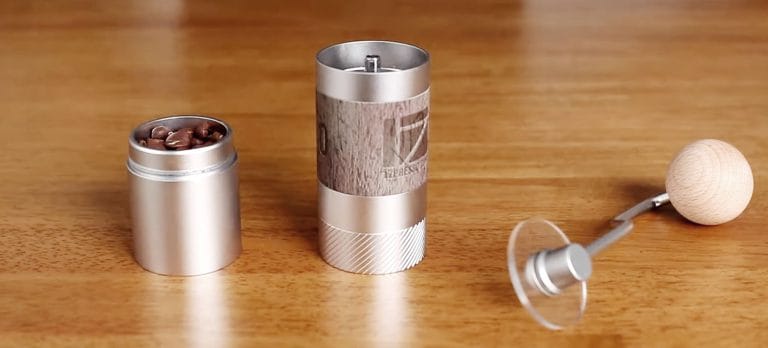

Very informative article. I’ve also hacked my Nutribullet for more than just smoothies, so it’s refreshing to see I’m not the only one. However, I noticed you didn’t mention anything about grinding times. Could you shed some light on optimal durations for different coarseness levels?
Thanks for highlighting the importance of using the milling blade, I successfully tried it this morning, and while not perfect, the convenience can’t be beaten.
I’ve got to say, I’m a bit skeptical about this. Aren’t blade grinders notorious for uneven grinds? How can the Nutribullet, even with the milling blade, overcome this issue? Has anyone compared the grind quality with a proper burr grinder?
You will never get even grinds with any blade grinder. But if you’re not that fussy about your daily cup and mainly drip coffee, it’ll do.
Tom, your point about cleaning the Nutribullet after grinding coffee is spot-on and cannot be overstressed. The oils from the coffee can really linger and affect your next blend. What’s your advice on the best way to thoroughly clean the Nutribullet without damaging the blade?
Many people like to grind rice to remove the coffee oils after wiping the inside of the blender.